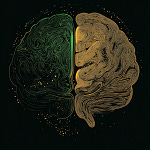The best conversations unravel new threads with every turn of phrase. You’re left with a tapestry, not of answers but of new possibilities. I had a feeling that a dialogue with Josh Schrei might weave that kind of tapestry, and I wasn’t disappointed.
If you haven’t heard of his podcast The Emerald, I’d highly recommend it. It’s gained a dedicated following over the last few years, and is as much an endeavour in ‘mythic sensemaking’ as it is an artistic expression. The Emerald “explores the human experience through a vibrant lens of myth, story, and imagination … drawing from a deep well of poetry, lore, and mythos to challenge conventional narratives on politics and public discourse, meditation and mindfulness, art, science, literature, and more.”
There are overlaps with Josh’s work and my own, so we covered a lot of terrain; AI, the meaning crisis, the return of ritual, and why an animate worldview might be essential if we’re to make it through the meta-crisis. You can find the episode above, or on the Substack app, Apple podcasts and most other podcasting platforms.
Tripping on Utopia
Thank you to everyone who read and commented on Nora Bateson’s piece ‘Communication is Sacred’ - it’s had a wonderful reception and felt like a positive way to launch guest pieces on The Bigger Picture. As I mentioned in my introduction to her essay, I’ve also been in touch with Benjamin Breen and he’s sent me a couple of paragraphs to give context in response to Nora’s piece, which you can find below:
I wrote Tripping on Utopia because I believe that history has important lessons to impart for anyone interested in the present and future of psychedelics. I did not try to glorify or to condemn any of the historical figures in my book; rather, I wanted to just understand them in the context of their time. The New Yorker’s review of Tripping noted that Margaret Mead and Gregory Bateson were "the most sympathetic figures in the book,” but it also noted that they are presented as part of much wider history which emphasizes the optimism and idealism of early psychedelic researchers during a period of enormous challenges. As I explain in a recent piece for the online magazine Nautilus, one key intervention I make is to retell the history of psychedelic therapy from the perspective of women in the 1940s and 1950s (not only Mead, but also pioneering therapists like Betty Eisner) rather than men in the '60s and '70s.
Another goal was simply to understand early psychedelic researchers on their own terms, which meant casting a wide net and thinking deeply about the intellectual foundations of their work. This is why the main theme of the book is utopian yet applied science — an approach that Mead in particular did more than anyone else to elevate in public discourse, and one that informed the work of everyone from the most well known figures in the history of psychedelics (Humphry Osmond, Aldous Huxley) to the less well known (like Eisner). As you can perhaps guess from this summary, Gregory Bateson is an important figure in the history I tell but this is not a biography of him. It’s a comprehensively researched history of the first generation of psychedelic scientists, the product of over five years of daily work and careful research in well over a dozen historical archives. If you’re interested in the science and culture of psychedelics, I think it’s worth your attention.
You can buy Tripping on Utopia on the US Amazon here or the UK Amazon here.












